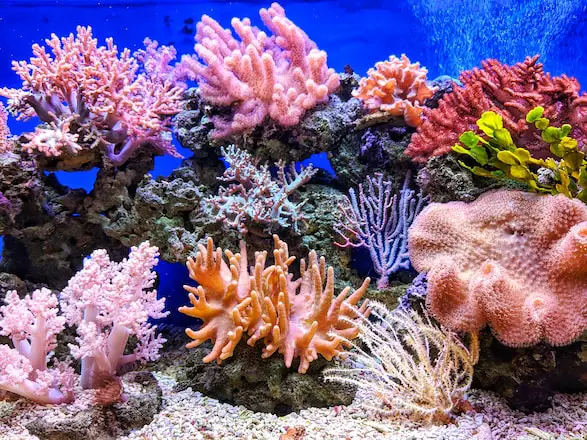Coral reefs are one of the most remarkable and diverse ecosystems on our planet. In this article we will explore the immense importance of coral reefs their incredible biodiversity and the ongoing efforts to conserve and protect these fragile underwater treasures.
The Significance of Coral Reefs
Coral reefs are often referred to as the “rainforests of the sea” due to their extraordinary biodiversity and critical role in supporting marine life. These magnificent underwater structures are formed by colonies of tiny organisms called coral polyps. Despite covering less than 1% of the Earth’s surface coral reefs provide a habitat for over 25% of marine species making them crucial hotspots of marine biodiversity.
Biodiversity Hotspots
Coral reefs support an astonishing array of life hosting a myriad of fish species marine invertebrates and other organisms. The intricate structures of the reefs offer shelter feeding grounds and breeding areas for countless species including vibrant tropical fish graceful sea turtles majestic rays and mesmerizing coral formations. The interconnectedness of these species within the reef ecosystem creates a delicate balance that is vital for the overall health of the marine environment.
Coastal Protection
Beyond their ecological significance coral reefs play a crucial role in coastal protection. The complex structures of the reefs act as natural barriers absorbing wave energy and reducing the impacts of storms hurricanes and coastal erosion. They help safeguard coastlines communities and valuable infrastructure from the destructive forces of the ocean providing a first line of defense against natural disasters.
Economic Value
Coral reefs hold immense economic value particularly for coastal communities dependent on fisheries and tourism. These vibrant ecosystems attract divers snorkelers and nature enthusiasts from around the world generating significant revenue and supporting local livelihoods. The fisheries associated with coral reefs provide a vital source of food and income for millions of people worldwide. The economic value of coral reefs highlights the importance of their preservation and sustainable management.
Threats to Coral Reefs
Despite their ecological and economic importance coral reefs face an array of threats that jeopardize their existence. Understanding these challenges is crucial for implementing effective conservation measures.
Climate Change and Ocean Acidification
Climate change poses one of the most significant threats to coral reefs. Rising ocean temperatures lead to coral bleaching a phenomenon where corals expel the symbiotic algae that give them their vibrant colors and essential nutrients. Prolonged or severe bleaching events can result in the death of coral colonies. Additionally increased carbon dioxide emissions contribute to ocean acidification making it more challenging for corals to build their calcium carbonate skeletons.
Pollution and Coastal Development
Pollution from land-based sources such as sediment runoff agricultural chemicals and wastewater discharge poses a severe threat to coral reefs. These pollutants can smother corals disrupt their delicate symbiotic relationships and contribute to the growth of harmful algae. Coastal development including the construction of ports resorts and coastal infrastructure often leads to habitat destruction sedimentation and pollution runoff further endangering coral reef ecosystems.
Overfishing and Destructive Fishing Practices
Overfishing and destructive fishing practices such as dynamite fishing and the use of cyanide have devastating impacts on coral reefs. Removing key species from the ecosystem disrupts the delicate balance and can lead to ecological cascades. Destructive fishing methods physically damage the reefs breaking apart coral structures and causing long-term damage to the ecosystem.
Conservation and Protection Efforts
Efforts to conserve and protect coral reefs are crucial for their survival and the preservation of marine biodiversity. A variety of strategies and initiatives are being employed to mitigate the threats and ensure the long-term health of these invaluable ecosystems.
Marine Protected Areas (MPAs)
The establishment of marine protected areas is a fundamental approach to safeguarding coral reefs. These designated zones provide a sanctuary for marine life allowing corals and associated species to thrive without disturbance. MPAs help protect critical habitats reduce the impacts of fishing and other human activities and promote the recovery of damaged ecosystems. Striving to expand the network of MPAs globally is essential for preserving coral reefs and their biodiversity.
Sustainable Tourism and Responsible Practices
Tourism can either contribute to the degradation of coral reefs or serve as a powerful force for conservation. Embracing sustainable tourism practices such as responsible diving and snorkeling can minimize physical damage to reefs and reduce the ecological footprint of visitors. Educating tourists about the importance of coral reefs and encouraging responsible behavior such as not touching or standing on corals is crucial for their preservation.
Community Engagement and Education
Engaging local communities in conservation efforts is vital for the long-term success of coral reef protection. Building awareness about the ecological and economic value of coral reefs providing alternative livelihood options and involving communities in decision-making processes empowers them to become stewards of these ecosystems. Education programs workshops and outreach initiatives play a crucial role in fostering a sense of ownership and inspiring action.
Climate Change Mitigation and Adaptation
Addressing climate change and its impacts on coral reefs is paramount. Reducing greenhouse gas emissions through sustainable practices and transitioning to renewable energy sources can help mitigate the effects of climate change. Additionally supporting research and implementing innovative solutions such as coral reef restoration and assisted evolution techniques can aid the adaptation of corals to changing environmental conditions.
Discover the Beauty and Fragility of Coral Reefs
Coral reefs are mesmerizing ecosystems teeming with life and beauty but they are also highly vulnerable to human-induced threats. By understanding their importance spreading awareness and actively participating in conservation efforts we can safeguard these invaluable treasures for future generations to cherish and protect.

Hi, I’m Jodie! I’m a spain-Moroccan writer with a passion for imagination, adventures, magic and stories with heart.
Please don’t hesitate to contact me for any questions, suggestions, comments or feedback.

















Add comment